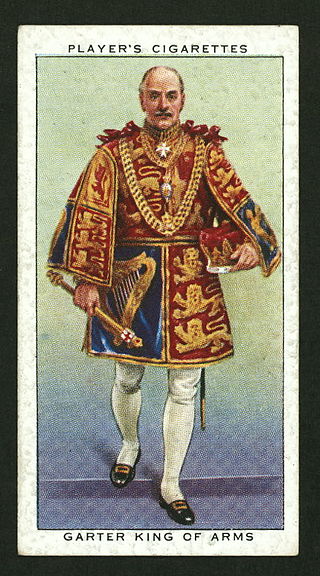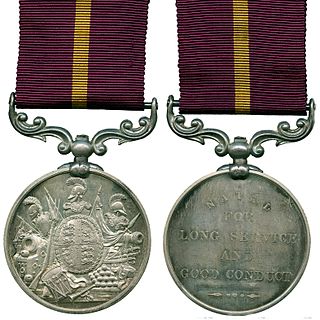This article needs additional citations for verification .(May 2023) |
The King of Arms of the Order of the British Empire is the herald of the Order of the British Empire, established in 1917 and effective since 1918.
This article needs additional citations for verification .(May 2023) |
The King of Arms of the Order of the British Empire is the herald of the Order of the British Empire, established in 1917 and effective since 1918.
| Name | Dates | Ref. |
|---|---|---|
| General the Rt. Hon. Sir Arthur Paget, GCB, GCVO | 1918–1928 | |
| Admiral Sir Herbert Heath, KCB, MVO | 1929–1947 | |
| Air Marshal Sir Charles Carr, KBE, CB, DFC, AFC | 1947–1968 | |
| Lieutenant General Sir George Gordon-Lennox, KBE, CB, CVO, DSO | 1968–1983 | |
| Admiral Sir Anthony Morton, GBE, KCB | 1983–1997 | |
| Air Chief Marshal Sir Patrick Hine, GCB, GBE | 1997–2011 | |
| Admiral Sir Peter Abbott, GBE, KCB | 2011–2015 | [1] |
| Lieutenant General Sir Robert Fulton, KBE | 2016–2024 | [2] |
| Lieutenant General Sir Simon Mayall, KBE, CB | 2024–present | [3] |

Gustaf V was King of Sweden from 8 December 1907 until his death in 1950. He was the eldest son of King Oscar II of Sweden and Sophia of Nassau, a half-sister of Adolphe, Grand Duke of Luxembourg. Reigning from the death of his father Oscar II in 1907 to his own death nearly 43 years later, he holds the record of being the oldest monarch of Sweden with the third-longest reign after Magnus IV (1319–1364) and Carl XVI Gustaf (1973–present). He was also the last Swedish monarch to exercise his royal prerogatives, which largely died with him, although they were formally abolished only with the remaking of the Swedish constitution in 1974. He was the first Swedish king since the High Middle Ages not to have a coronation and so never wore the king's crown, a practice that has continued ever since.

The Most Excellent Order of the British Empire is a British order of chivalry, rewarding contributions to the arts and sciences, work with charitable and welfare organizations, and public service outside the civil service. It was established on 4 June 1917 by King George V and comprises five classes across both civil and military divisions, the most senior two of which make the recipient either a knight if male or dame if female. There is also the related British Empire Medal, whose recipients are affiliated with, but not members of, the order.

The usher of the Black Rod is an official in the parliaments of several countries of the Commonwealth of Nations. The title is often shortened to Black Rod, and in some countries, formally known as Gentleman Usher of the Black Rod if male, or Lady Usher of the Black Rod if female. The position originates in the House of Lords in the Parliament of the United Kingdom. Equivalent positions also exist in Australia, Canada and New Zealand.

The Most Honourable Order of the Bath is a British order of chivalry founded by King George I on 18 May 1725. Recipients of the Order are usually senior military officers or senior civil servants, and the monarch awards it on the advice of His Majesty's Government.The name derives from an elaborate medieval ceremony for preparing a candidate to receive his knighthood, of which ritual bathing was an element. While not all knights went through such an elaborate ceremony, knights so created were known as "knights of the Bath".

The Most Distinguished Order of Saint Michael and Saint George is a British order of chivalry founded on 28 April 1818 by George, Prince of Wales, while he was acting as prince regent for his father, King George III. It is named in honour of two military saints, Michael and George.

The Most Ancient and Most Noble Order of the Thistle is an order of chivalry associated with Scotland. The current version of the order was founded in 1687 by King James VII of Scotland, who asserted that he was reviving an earlier order. The order consists of the sovereign and sixteen knights and ladies, as well as certain "extra" knights. The sovereign alone grants membership of the order; they are not advised by the government, as occurs with most other orders.
The following is the order of precedence in England and Wales as of May 2024. Separate orders exist for men and women.

The Most Exalted Order of the Star of India is an order of chivalry founded by Queen Victoria in 1861. The Order includes members of three classes:

The King's Gallantry Medal (KGM), formerly the Queen's Gallantry Medal (QGM), is a United Kingdom decoration awarded for exemplary acts of bravery where the services were not so outstanding as to merit the George Medal, but above the level required for the King's Commendation for Bravery.
Air Chief Marshal Sir Patrick Bardon Hine, is a former senior Royal Air Force commander. Most notably, he was joint commander of all British forces during the Gulf War.

Sir Gerald Woods Wollaston was a long-serving officer of arms at the College of Arms in London. Wollaston's family had a firm tradition at the College of Arms. Wollaston's great-grandfather was Sir William Woods, Garter Principal King of Arms from 1838 until his death in 1842. His grandfather was Sir Albert William Woods who held the same post from 1869 to 1904.

General John Nicholas Reynolds Houghton, Baron Houghton of Richmond, is a retired senior British Army officer and former Chief of the Defence Staff (CDS) of the British Armed Forces. He was appointed CDS in July 2013, following the retirement of General Sir David Richards. He served as Commanding Officer of the 1st Battalion, the Green Howards in Northern Ireland during The Troubles and later became Commander of the 39th Infantry Brigade in Northern Ireland. He deployed as Senior British Military Representative and Deputy Commanding General, Multi-National Force – Iraq during the Iraq War. Later, he became Chief of Joint Operations at Permanent Joint Headquarters and served as Vice-Chief of the Defence Staff until assuming the position of CDS. Houghton retired from the British Army in July 2016, and was succeeded as CDS by Air Chief Marshal Sir Stuart Peach.
Rodney Onslow Dennys, was a British foreign service operative and long-serving officer of arms at the College of Arms in London. During World War II he served in the Intelligence Corps of the British Army.

Lieutenant General Sir Robert Henry Gervase Fulton, is a retired British Royal Marines officer who served as Governor of Gibraltar from 2006 to 2009.

Edward VIII, later known as the Duke of Windsor, was King of the United Kingdom and the Dominions of the British Empire, and Emperor of India, from 20 January 1936 until his abdication in December of the same year.

Lieutenant General Sir Simon Vincent Mayall, is a retired British Army officer and a Middle East Adviser at the Ministry of Defence.

The Permanent Forces of the Empire Beyond the Seas Medal is a long service and good conduct medal, instituted for award to other ranks of the Permanent Forces of the Dominions and Colonies of the British Empire. The medal, also known as the Permanent Overseas Forces Long Service and Good Conduct Medal, was established in 1910 as a single common award to supersede the several local versions of the Army Long Service and Good Conduct Medal which were being awarded by the various territories.

In May 1895, Queen Victoria authorised Colonial governments to adopt various British military medals and to award them to their local military forces. The Colony of Natal introduced this system in August 1895 and, in 1897, instituted the Army Long Service and Good Conduct Medal (Natal).